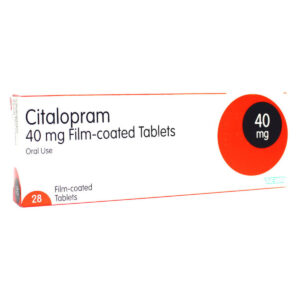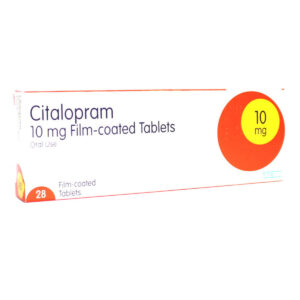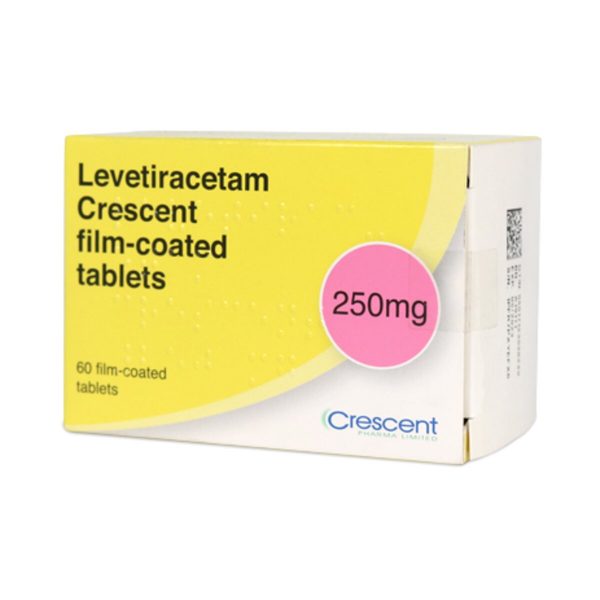- Description
- Additional Information
- Brand
- How To Use
- Product Details
- Side Effects
- Ingredients
- How to Store
- Patient Information leaflet
- Reviews (2)
- Questions & Answers (1)
Citalopram 20mg Tablets, 28 Tablets
Looking for a powerful antidepressant that can help you recover from your illness? Look no further than Citalopram 20mg Tablets! These tablets contain the active ingredient citalopram, which is part of a group of drugs known as Selective Serotonin Reuptake Inhibitors (SSRIs). SSRIs work by correcting chemical imbalances in the brain that can cause symptoms like depression, anxiety, and fatigue. With Citalopram, you can expect to see a decrease in your symptoms and an improvement in your mood and overall well-being. So don’t wait any longer, get started on your road to recovery with Citalopram today! Speak to your doctor about citalopram 20mg.
Citalopram 20mg Tablets Reviews
After using Citalopram 20mg Tablets, it’s helpful to let others know about your experience. Reviews of an item help other users know that medicines received have helped the condition it is claimed for, how well the treatment worked or any issues to be aware of. We invite our users to leave a review of both their treatment and of the service provided. Click on the reviews tab to see if there has been feedback on this item.
What is the price of Citalopram 20mg Tablets?
The price of Citalopram 20mg Tablets is £5.50
Where can you buy Citalopram 20mg Tablets?
You can buy Citalopram 20mg Tablets at Dock Pharmacy Essex UK, UK Online Pharmacy.
Can you buy Citalopram 20mg Tablets Over the counter?
Citalopram 20mg Tablets is not available to buy over the counter. You need a prescription to buy Citalopram 20mg Tablets
| Brand | |
|---|---|
Brand
Citalopram
How To Use
How To Use
How and when to take your tablets The tablets must be taken once a day either in the morning or in the evening, with or without food. They should be swallowed whole with a glass of water. Do not chew them (they have a bitter taste).
Recommended dose Adults Depression:
The usual dose is 20 mg per day. This may be increased by your doctor to a maximum of 40 mg per day. Pharma code Panic disorder: The starting dose is 10 mg per day for the first week before increasing the dose to 20-30 mg per day. The dose may be increased by your doctor to a maximum of 40 mg per day
Elderly patients (above 65 years of age) The starting dose should be decreased to half of the recommended dose, e.g. 10-20 mg per day. Elderly patients should not usually receive more than 20 mg per day
Product Details
Product Information
What you need to know before you take Citalopram Tablets
Do not take Citalopram Tablets • if you are allergic to citalopram or to any of the other ingredients of this medicine (listed in section 6). • if you are taking pimozide (an antipsychotic medicine). • at the same time as taking medication known as monoamine oxidase inhibitors (MAOIs). MAOIs include medicines such as phenelzine, iproniazid, isocarboxazid, nialamide, tranylcypromine and moclobemide (used for the treatment of depression), selegiline (used in the treatment of Parkinson’s disease) and linezolid (an antibiotic). Even if you have finished taking one of the following MAOIs: phenelzine, iproniazid, isocarboxazid, nialamide or tranylcypromine you will need to wait 2 weeks before you start taking your Citalopram Tablets. One day must elapse after you have finished taking moclobemide. After stopping Citalopram Tablets, you must allow 1 week before taking any MAOI. • if you are born with or have had an episode of abnormal heart rhythm (seen at ECG; an examination to evaluate how the heart is functioning). • if you take medicines for heart rhythm problems or that may affect the heart’s rhythm (see section “Other medicines and Citalopram”). Warnings and precautions Talk to your doctor or pharmacist before taking Citalopram Tablets • if you suffer from any mental illnesses • if you have diabetes, because the dosage of your anti-diabetic medicine may have to be changed • if you have epilepsy or a history of seizures or fits • if you are having ECT (electroconvulsive therapy) • if you have mania or panic disorder • if you have or have ever had a bleeding disorder, or have ever suffered from bleeding in the stomach or intestines, or if you are pregnant (see section 2 `Pregnancy, breast-feeding, and fertility’) • if you have liver disease • if you have kidney disease • if you suffer or have suffered from heart problems or have recently had a heart attack • if you have a low resting heart-rate and/or you know that you may have salt depletion as a result of prolonged severe diarrhoea and vomiting (being sick) or usage of diuretics (water tablets) • if you experience a fast or irregular heartbeat, fainting, collapse, or dizziness on standing up which may indicate abnormal functioning of the heart rate • if you have low blood sodium levels • if you experience fever, confusion, abnormal movements, shivering, muscle spasms, agitation, and progress to coma or loss of consciousness, restlessness, sweating, exaggeration of reflexes, muscle cramps, or rapid heart rate which may be a sign of a condition known as ‘serotonin syndrome’ • if you have or have previously had eye problems, such as certain kinds of glaucoma (increased pressure in the eye). Medicines like Citalopram Tablets (so called SSRI’s) may cause symptoms of sexual dysfunction (see section 4). In some cases, these symptoms have continued after stopping treatment. Please consult your doctor, even if these statements were applicable to you at any time in the past. Please note: Some patients with manic-depressive illness may enter into a manic phase. This is characterized by unusual and rapidly changing ideas, inappropriate happiness and excessive physical activity. If you experience this, contact your doctor. Symptoms such as restlessness or difficulty in sitting or standing still can also occur during the first weeks of the treatment. Tell your doctor immediately if you experience these symptoms. Special information relating to your disease As with other medicines used to treat depression or related diseases, the improvement is not achieved immediately. After the start of Citalopram Tablets treatment, it may take several weeks before you experience any improvement. At the start of the treatment, certain patients may experience increased anxiety, which will disappear during continued treatment. Therefore, it is very important that you follow exactly your doctor’s orders and do not stop the treatment or change the dose without consulting your doctor. Thoughts of suicide and worsening of your depression or anxiety disorder If you are depressed and/or have anxiety disorders, you can sometimes have thoughts of harming or killing yourself. These may be increased when first starting antidepressants, since these medicines all take time to work, usually about two weeks but sometimes longer. You may be more likely to think like this: • if you have previously had thoughts about killing or harming yourself; • if you are a young adult. Information from clinical trials has shown an increased risk of suicidal behaviour in adults aged less than 25 years with psychiatric conditions who were treated with an antidepressant. If you have thoughts of harming or killing yourself at any time, contact your doctor or go to a hospital straight away. You may find it helpful to tell a relative or close friend that you are depressed or have an anxiety disorder, and ask them to read this leaflet. You might ask them to tell you if they think your depression or anxiety is getting worse, or if they are worried about changes in your behaviour. Use in children and adolescents under 18 years of age Citalopram Tablets should normally not be used for children and adolescents under 18 years. Also, you should know that patients under 18 have an increased risk of side effects such as suicide attempt, suicidal thoughts, and hostility (predominantly aggression, oppositional behaviour and anger) when they take this class of medicines. Despite this, your doctor may prescribe Citalopram Tablets for patients under 18 because he/she decides that this is in their best interest. If your doctor has prescribed Citalopram Tablets for a patient under 18 and you want to discuss this, please go back to your doctor. You should inform your doctor if any of the symptoms listed above develop or worsen when patients under 18 are taking Citalopram Tablets. Also, the long-term safety effects concerning growth, maturation, cognitive, and behavioural development of Citalopram Tablets in this age group have not yet been demonstrated. Other medicines and Citalopram Tablets Tell your doctor or pharmacist if you are taking, have recently taken, or might take any other medicines, including medicines obtained without a prescription and herbal remedies. This includes other medicines for depression (see Do not take Citalopram Tablets). This is especially important if you are taking • The herbal remedy St John’s wort (Hypericum perforatum). This should not be taken at the same time as Citalopram Tablets. • Monoamine oxidase inhibitors (MAOIs). These should not be taken at the same time as Citalopram Tablets (see Do not take Citalopram Tablets). Tell your doctor if you are taking any of the following medicines: • Linezolid (an antibiotic). • Sumatriptan (used to treat migraine) or tramadol (a pain killer). If you feel unwell when using these medicines with Citalopram Tablets you should see your doctor. • Lithium (used to prevent and treat mania) and tryptophan (an antidepressant). • Pimozide (a neuroleptic). This should not be taken at the same time as Citalopram Tablets. • Imipramine and desipramine (used to treat depression). • Medicines containing selegiline (used to treat Parkinson’s disease). • Cimetidine, lansoprazole, and omeprazole (used to treat stomach ulcers), fluconazole (used to treat fungal infections), fluvoxamine (antidepressant), and ticlopidine (used to reduce the risk of stroke). These may cause increased blood levels of citalopram. • Mefloquine (used to treat malaria). • Bupropion (used to treat depression). • Medicines known to affect the blood platelets (e.g. anticoagulant drugs used to treat or prevent blood clots; aspirin and non-steroidal anti-inflammatory drugs (NSAIDs) such as ibuprofen and diclofenac used as painkillers and some antipsychotic drugs and tricyclic antidepressants). • Metoprolol, a beta blocker used to treat migraine, some heart conditions and high blood pressure. The effects of either drug could be increased, decreased, or altered. • Neuroleptics (used in the treatment of schizophrenia). Do not take Citalopram Tablets if you take medicines for heart rhythm problems or medicines that may affect the heart’s rhythm, e.g. such as Class IA and III antiarrhythmics, antipsychotics (e.g. phenothiazine derivatives, pimozide, haloperidol), tricyclic antidepressants, certain antimicrobial agents (e.g. sparfloxacin, moxifloxacin, erythromycin IV, pentamidine, anti-malarial treatment particularly halofantrine), certain antihistamines (astemizole, mizolastine). If you have any further questions about this, you should speak to your doctor. Taking Citalopram Tablets with food, drink, and alcohol Citalopram Tablets can be taken with or without food (see section 3 “How to take Citalopram Tablets”). As with all antidepressants, it is sensible to avoid drinking alcohol whilst receiving treatment although Citalopram Tablets have not been shown to increase the effects of alcohol. Pregnancy, breast-feeding, and fertility If you are pregnant or breast-feeding, think you may be pregnant or are planning to have a baby, ask your doctor for advice before taking this medicine. Do not take Citalopram Tablets if you are pregnant or breast-feeding unless you have discussed the risks and benefits involved. Pregnancy Make sure your midwife and/or doctor know you are on Citalopram Tablets. When taken during pregnancy, particularly in the last 3 months of pregnancy, medicines like citalopram may increase the risk of a serious condition in babies, called persistent pulmonary hypertension of the new born (PPHN), making the baby breathe faster and appear bluish. These symptoms usually begin during the first 24 hours after the baby is born. If this happens to your baby, you should contact your midwife and/or doctor immediately. Also, if you take Citalopram Tablets during the last 3 months of your pregnancy and until the date of birth you should be aware that the following effects may be seen in your newborn: fits, being too hot or cold, feeding difficulties, vomiting, low blood sugar, stiff or floppy muscles, overactive reflexes, tremor, jitteriness, irritability, lethargy, constant crying, sleepiness or sleeping difficulties. If your newborn baby gets any of these symptoms, please contact your midwife and/or doctor immediately. If you take Citalopram Tablets near the end of your pregnancy there may be an increased risk of heavy vaginal bleeding shortly after birth, especially if you have a history of bleeding disorders. Your doctor or midwife should be aware that you are taking Citalopram Tablets so they can advise you. Breast-feeding Ask your doctor or pharmacist for advice before taking any medicine. If you are breast-feeding, ask your doctor for advice. You should not breast-feed your baby when taking Citalopram Tablets because small amounts of the medicine can pass into the breast milk. Fertility Citalopram has been shown to reduce the quality of sperm in animal studies. Theoretically, this could affect fertility, but impact on human fertility has not been observed as yet. Ask your doctor or pharmacist for advice before taking any medicine. Driving and using machines Citalopram Tablets do not usually affect the ability to carry out normal daily activities. However, if you feel dizzy or sleepy when you start to take this medicine, you should be careful when driving, operating machinery or performing jobs that need you to be alert until these effects wear off. Citalopram Tablets contain lactose and sodium Citalopram Tablets contains lactose. If you have been told that you cannot digest or tolerate some sugars, contact your doctor before taking this medicinal product. This medicine contains less than 1 mmol sodium (23 mg) per tablet, that is to say essentially `sodium-free’
Side Effects
Possible side effects
Like all medicines, this medicine can cause side effects, although not everybody gets them. Several of the effects listed below can also be symptoms of your illness and may disappear as you start to get better. Serious side effects Stop taking Citalopram Tablets and seek medical advice immediately if you have any of the following symptoms: • Difficulty in breathing. • Swelling of the face, lips, tongue, or throat that causes difficulty in swallowing or breathing. • Severe itching of the skin (with raised lumps). • Fast, irregular heartbeat, fainting which could be symptoms of a life-threatening condition known as torsades de pointes. Contact your doctor at once if you experience any of the following as your Citalopram Tablets dose may need to be reduced or stopped • You start having fits for the first time or fits that you have suffered from in the past become more frequent. • Your behaviour changes because you feel elated or over excited. • You experience high fever, agitation, confusion, trembling or abrupt contractions of muscles. These may be signs of a rare condition called serotonin syndrome. • Tiredness, confusion and twitching of your muscles. These may be signs of a low blood level of sodium (hyponatraemia). If you have thoughts of harming or killing yourself at any time, contact your doctor or go to a hospital straight away. The following side effects are often mild and usually disappear after a few days’ treatment. Very common (may affect more than 1 in 10 people) • Dry mouth (a dry mouth increases the risk of tooth decay, so be sure to clean your teeth more often than normal) • Headache • Sleepiness • Difficulty in sleeping • Changes in sleep pattern • Feeling sick (nausea) • Loss of body strength, weakness • Increased sweating Common (may affect up to 1 in 10 people) • Lack of appetite • Agitation • Decreased sex drive • Anxiety • Nervousness • Confusion • Abnormal dreams • Reduced emotions, indifference (apathy) • Tremor • Tingling or numbness in the hands or feet • Dizziness • Problems concentrating • Migraine • Loss of memory (amnesia) • Ringing in the ears (tinnitus) • Palpitations • Yawning • Blocked or runny nose (rhinitis) • Diarrhoea • Vomiting • Constipation • Stomach pain • Flatulence (wind) • Increase in saliva (drooling) • Itching • Pain in muscles and joints • For men, problems with ejaculation and erection • For women, failing to reach an orgasm • Tiredness • Prickling of the skin • Loss of weight Uncommon (may affect up to 1 in 100 people) • Weight increase • Increased appetite • Sensitivity to sunlight • Aggression • Fainting • Large pupils (the dark centre of the eye) • Swelling of the arms and legs • Bruising easily • Hallucinations • Mania • Fast heartbeat • Slow heartbeat • Nettle rash • Loss of hair • Rash • Difficulties urinating • Excessive menstrual bleeding Rare (may affect up to 1 in 1000 people) • Taste disturbances • Increased sex drive • Convulsions • Involuntary movements • Bleeding • Coughing • Hepatitis • Feeling unwell (malaise) Other side effects also reported (frequency unknown) • An increase in bleeding or bruising caused by reduced number of platelets in blood (thrombocytopenia) • Abnormal liver function tests • Thoughts of harming or killing themselves, see also section 2 “What you need to know before you take Citalopram Tablets” • Rash (hypersensitivity) • Low potassium levels in the blood (hypokalaemia), which can cause muscle weakness, twitching or abnormal heart rhythms • Panic attack • Grinding teeth • Restlessness • Unusual muscle movements or stiffness • Involuntary movements of the muscles (akathisia) • Low blood pressure • Nosebleed • Bleeding disorders including skin and mucosal bleeding (ecchymosis) • Sudden swelling of skin or mucosa • In men, painful erections • Flow of breast milk in men or in women who are not breast-feeding (galactorrhoea) • Irregular menstrual periods • Heavy vaginal bleeding shortly after birth (postpartum haemorrhage), see section 2 `Pregnancy, breast-feeding, and fertility’ for more information • An increased risk of bone fractures has been observed in patients taking this type of medicines • Abnormal heart rhythm SSRIs can, very rarely, increase the risk of bleeding, including stomach or intestinal bleeding. Let your doctor know if you vomit blood or develop black or blood-stained stools. Also let your doctor know if you continue to have other symptoms associated with your depression. This might include hallucinations, anxiety, mania, or confusion. Any side effects that do occur will usually disappear after a few days. If they are troublesome or persistent, or if you develop any other unusual side effects while taking Citalopram Tablets, please tell your doctor. Reporting of side effects If you get any side effects, talk to your doctor or pharmacist. This includes any possible side effects not listed in this leaflet. You can also report side effects directly via the Yellow Card Scheme at: www.mhra.gov.uk/yellowcard or search for MHRA Yellow Card in the Google Play or Apple App Store. By reporting side effects, you can help provide more information on the safety of this medicine.
Ingredients
Ingredients
Each Citalopram 20 mg Tablet contains 20 mg of the active ingredient citalopram (as the hydrobromide).
The other ingredients are microcrystalline cellulose, lactose monohydrate, croscarmellose sodium, maize starch, glycerol, copovidone, and magnesium stearate.
How to Store
How to Store
Keep all medicines out of the sight and reach of children. There are no special storage conditions for Citalopram Tablets. Do not use this medicine after the expiry date which is stated on the carton and blister after EXP. This date refers to the last day of that month. Do not throw away any medicines via wastewater or household waste. Ask your pharmacist how to throw away medicines you no longer use. These measures will help protect the environment.
Patient Information leaflet
Click here for the Patient Information leaflet
Please read before using the product
2 reviews for Citalopram 20mg Tablets, 28 Tablets
Only logged in customers who have purchased this product may leave a review.
Questions and answers of the customers
- A generic cialis pills online tadalafilise.cyou/#
You Might Also Like
Citalopram 40mg Tablets, 28 Tablets Looking for a powerful antidepressant that can help you recover from your illness? Look no further than Citalopram 40mg Tablets! These tablets contain the active ingredient citalopram, which is part of a group of drugs known as Selective Serotonin Reuptake Inhibitors (SSRIs). SSRIs work by correcting chemical imbalances in the […]
Learn More£5.50
- Availability: in stock
Escitalopram Tablets are available in 3 strengths:
- Escitalopram 5mg Tablets
- Escitalopram 10mg Tablets
- Escitalopram 20mg Tablets
£5.00
- Availability: in stock
Citalopram 10mg Tablets, 28 Tablets Looking for a powerful antidepressant that can help you recover from your illness? Look no further than Citalopram 10mg Tablets! These tablets contain the active ingredient citalopram, which is part of a group of drugs known as Selective Serotonin Reuptake Inhibitors (SSRIs). SSRIs work by correcting chemical imbalances in the brain […]
Learn More£5.00
- Availability: in stock
Other Products From This Seller
£69.50 – £79.95
Griseofulvin Oral Suspension, 200ml Griseofulvin Oral Suspension – Reliable Solution for Fungal Infections Griseofulvin Oral Suspension is a trusted antifungal medication designed to treat infections caused by fungi affecting the hair, skin, scalp, groin, feet, and nails, including ringworm, athlete’s foot, and jock itch. This suspension works by targeting and killing fungi, incorporating itself into […]
Learn More£69.50 – £79.95
- Availability: in stock
Griseofulvin 500mg Tablets, 100 Tablets Griseofulvin 500mg Tablets – Powerful Antifungal Treatment for Fungal Skin Infections Griseofulvin 500mg Tablets are a trusted solution for treating fungal infections affecting the skin, hair, and nails. This antifungal medication works by targeting the fungi responsible for conditions like ringworm, athlete’s foot, jock itch, and nail infections. Griseofulvin incorporates […]
Learn More£174.50
- Availability: in stock
Original price was: £196.50.£189.50Current price is: £189.50.
Fludrocortisone Acetate Solution 0.1mg/ml, 50ml Fludrocortisone Acetate Solution 0.1mg/ml, 50ml is a trusted liquid corticosteroid for treating adrenal insufficiency and electrolyte imbalances in humans and pets. This versatile solution is ideal for managing Addison’s disease and other adrenal health concerns, particularly in cats and dogs. Key Benefits For Humans: Effective treatment for adrenal insufficiency and […]
Learn MoreOriginal price was: £196.50.£189.50Current price is: £189.50.
- Availability: in stock
Fluoxetine Dispersible Tablets 20mg, 28 Tablets Fluoxetine Dispersible Tablets 20mg, 28 Tablets are a highly effective treatment for anxiety, depression, and behavioral challenges in both humans and pets. Whether you’re managing emotional health or addressing behavioral concerns in your furry friends, these tablets offer reliable and trusted relief. Why Choose Fluoxetine Dispersible Tablets? Versatile Treatment […]
Learn More£5.50
- Availability: in stock
Original price was: £34.99.£24.95Current price is: £24.95.
Wahl Extreme Grip Beard Trimmer Precision Grooming with Comfort Grip and Adjustable Cutting Lengths Take Control of Your Grooming with the Wahl Extreme Grip Beard Trimmer Transform your grooming routine with the Wahl Extreme Grip Beard Trimmer, designed for precision, comfort, and versatility. Whether you’re sculpting a sharp beard line, maintaining stubble, or styling longer […]
Learn MoreOriginal price was: £34.99.£24.95Current price is: £24.95.
- Availability: in stock
Original price was: £23.99.£17.95Current price is: £17.95.
WAHL Vogue Corded Hair Clipper for Men Professional Precision with Adjustable Taper Lever and High-Carbon Steel Blades Transform Your Grooming Routine with the WAHL Vogue Corded Hair Clipper for Men Elevate your grooming experience with the WAHL Vogue Corded Hair Clipper, a professional-grade grooming tool designed for men who value precision and performance. Whether you’re […]
Learn MoreOriginal price was: £23.99.£17.95Current price is: £17.95.
- Availability: in stock
Original price was: £30.00.£8.95Current price is: £8.95.
Wahl Peaky Blinders Beard Trimmer Gift Set Limited Edition Cordless Grooming Kit for Men Join the ranks of the Peaky Blinders with the Wahl Peaky Blinders Beard Trimmer Gift Set. This exclusive collaboration between Wahl and the iconic TV series offers a comprehensive grooming solution for the modern gentleman. Key Features: Rechargeable Cordless Trimmer: Equipped […]
Learn MoreOriginal price was: £30.00.£8.95Current price is: £8.95.
- Availability: in stock
Original price was: £54.63.£39.95Current price is: £39.95.
OMRON RS2 Wrist Blood Pressure Monitor Compact and Accurate BP Monitoring The OMRON RS2 Wrist Blood Pressure Monitor is a compact and user-friendly device designed for quick and accurate blood pressure and pulse rate measurements. Utilizing the oscillometric method, it ensures reliable readings with minimal user input. Key Features: Automatic Inflation: The device inflates the […]
Learn MoreOriginal price was: £54.63.£39.95Current price is: £39.95.
- Availability: in stock
Original price was: £69.99.£59.99Current price is: £59.99.
Omron M4 Intelli IT Blood Pressure Monitor Bluetooth-Enabled Upper Arm BP Monitor with Intelli Wrap Cuff The Omron M4 Intelli IT Blood Pressure Monitor is a clinically validated device designed for easy and accurate blood pressure monitoring at home. With Bluetooth connectivity, it seamlessly syncs your readings to the Omron Connect app, allowing you to […]
Learn MoreOriginal price was: £69.99.£59.99Current price is: £59.99.
- Availability: in stock
Original price was: £39.99.£33.95Current price is: £33.95.
Omron M2+ Upper Arm Blood Pressure Monitor The Omron M2+ Upper Arm Blood Pressure Monitor is a fully automatic device designed to provide quick and accurate blood pressure and pulse rate measurements. Utilizing the oscillometric method, it ensures reliable readings with minimal user input. Key Features: IntelliSense Technology: Automatically inflates the cuff to the ideal […]
Learn MoreOriginal price was: £39.99.£33.95Current price is: £33.95.
- Availability: in stock





















Anonymous (verified owner) –
Amanda Grinter (verified owner) –